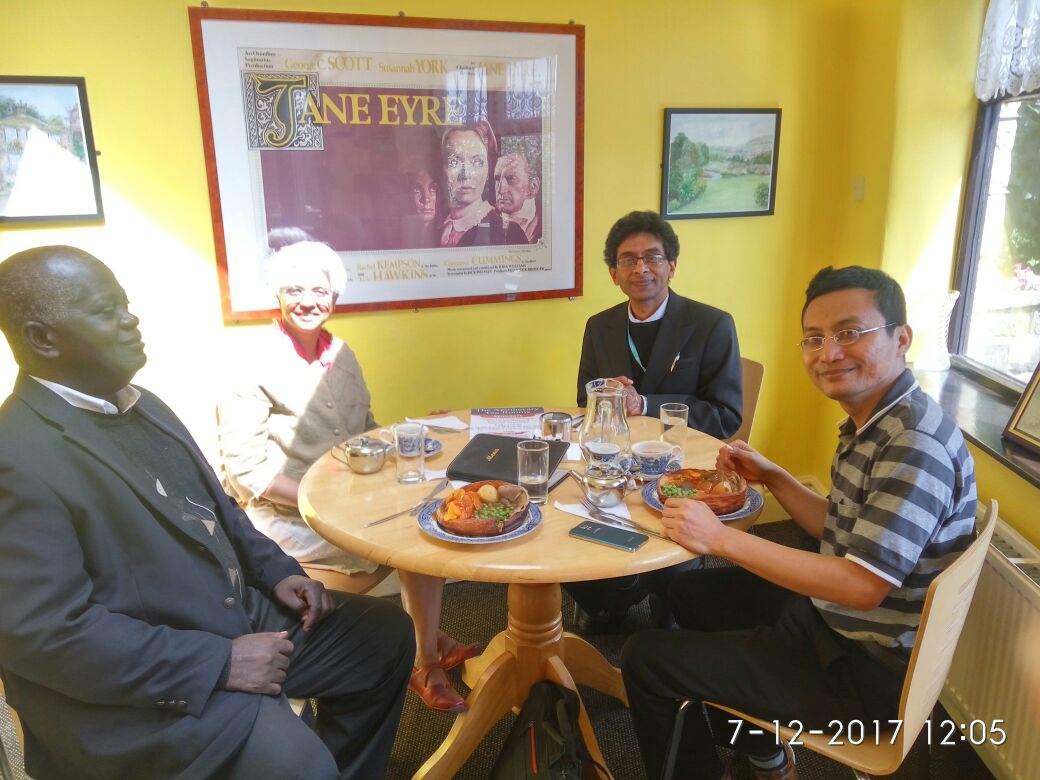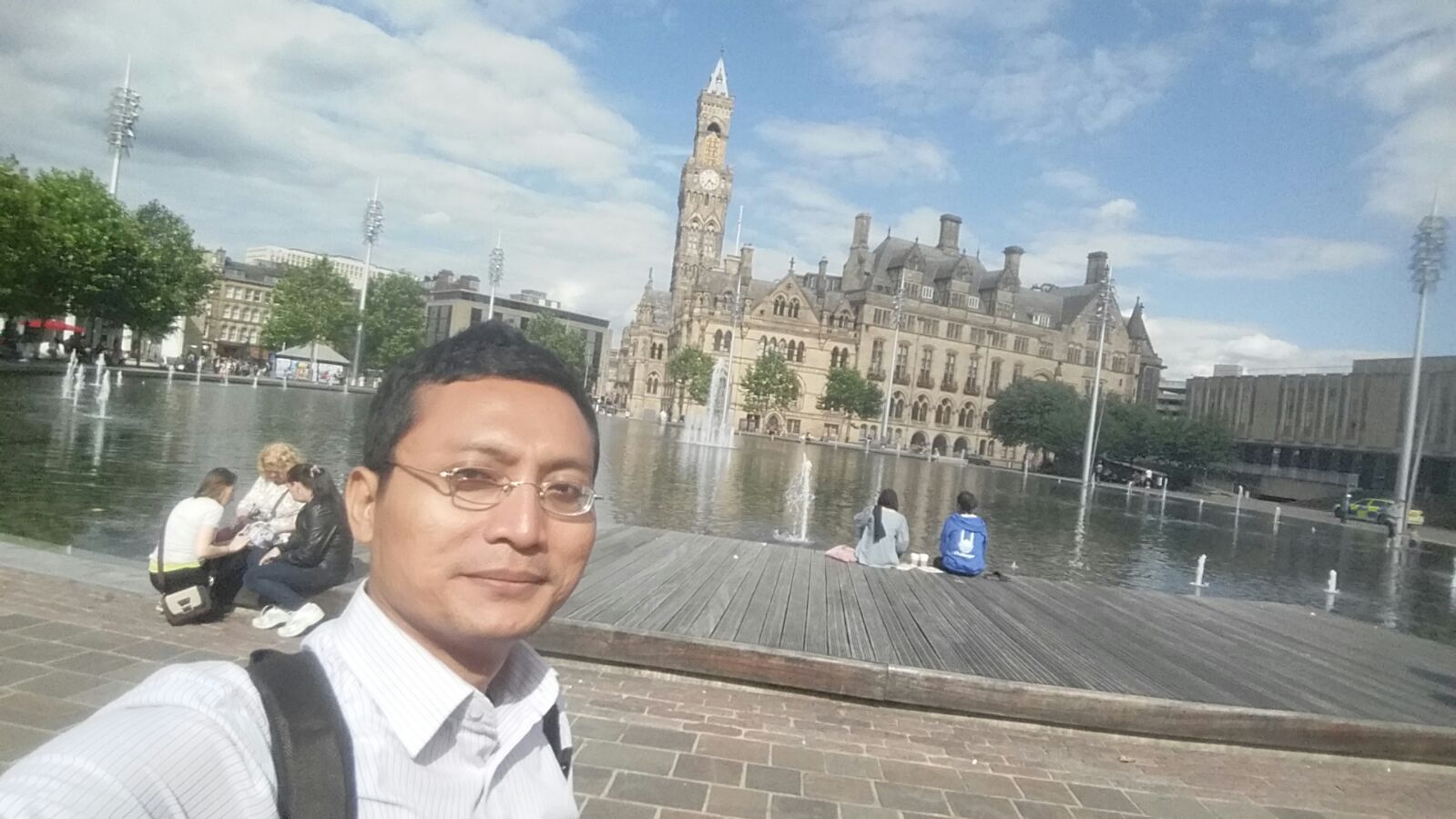On July 13 – 14, 2017, Dr. Eko Priyo Purnomo, A Former IGOV Director whom currently positioned as the Executive Director of Cooperation and International Affairs, is invited to join the British Academy supported Research Workshop on ‘Healthy, Inclusive and Sustainable Cities’ at the University of Bradford.
 The invitation came from his former PhD Supervisor at the University of Bradford, Dr. PB Anand at the Division of Peace Studies and International Development, whom awarded the International Partnership and Mobility Award of the British Academy for a three year research project on Inclusive, Smart and Sustainable cities, along with Professor Sudhir Chella Rajan in the Department of Humanities and Social Sciences at the Indian Institute of Technology (IIT) Madras, Chennai, India
The invitation came from his former PhD Supervisor at the University of Bradford, Dr. PB Anand at the Division of Peace Studies and International Development, whom awarded the International Partnership and Mobility Award of the British Academy for a three year research project on Inclusive, Smart and Sustainable cities, along with Professor Sudhir Chella Rajan in the Department of Humanities and Social Sciences at the Indian Institute of Technology (IIT) Madras, Chennai, India
The programme aims to promote dialogue and debate amongst scholars and policy makers through five research workshops to be organised between 2015 and 2018. It focuses on Healthy Cities Networks, Sustainable and Inclusive city, National and Global Forces, Challenges and Opportunities which can be adapted and leveraged for healthy and sustainable urban citizens.
 In this occasion, the Alumna of the University of Bradford, Dr. Eko Priyo Purnomo will have a presentation on Friday, July 14, 2017 at his Alma Mater. The presentation will discuss about whether Yogyakarta is a smart, resilient, and healthy City. During the breaks of his visit Dr. Eko had some discussions on the possibilities for the Research Collaboration with some International Institutions.
In this occasion, the Alumna of the University of Bradford, Dr. Eko Priyo Purnomo will have a presentation on Friday, July 14, 2017 at his Alma Mater. The presentation will discuss about whether Yogyakarta is a smart, resilient, and healthy City. During the breaks of his visit Dr. Eko had some discussions on the possibilities for the Research Collaboration with some International Institutions.
At the second day of his arrival, he went to the Royds enterprise, a social enterprise formed in 1994 to help revitalise the villages of Buttershaw, Woodside and Delph Hill in South Bradford. Covering an area with a population of around 12,000 people and 3,500 dwellings.
 Followed by lunch and some discussions, they visited the Salts Mill. The Mill opened in 1853, the centerpiece of Sir Titus Salt’s utopian vision of Saltaire. He built the adjoining model village to house his workers. Cloth production at Salts finally ceased in 1986, and the following year the mill was purchased by the late Jonathan Silver, who re-imagined it as a place where culture and commerce could thrive together. the Saltaire is now registered as the UNESCO World Heritage. (Amir)
Followed by lunch and some discussions, they visited the Salts Mill. The Mill opened in 1853, the centerpiece of Sir Titus Salt’s utopian vision of Saltaire. He built the adjoining model village to house his workers. Cloth production at Salts finally ceased in 1986, and the following year the mill was purchased by the late Jonathan Silver, who re-imagined it as a place where culture and commerce could thrive together. the Saltaire is now registered as the UNESCO World Heritage. (Amir)
 The invitation came from his former PhD Supervisor at the University of Bradford, Dr. PB Anand at the Division of Peace Studies and International Development, whom awarded the International Partnership and Mobility Award of the British Academy for a three year research project on Inclusive, Smart and Sustainable cities, along with Professor Sudhir Chella Rajan in the Department of Humanities and Social Sciences at the Indian Institute of Technology (IIT) Madras, Chennai, India
The invitation came from his former PhD Supervisor at the University of Bradford, Dr. PB Anand at the Division of Peace Studies and International Development, whom awarded the International Partnership and Mobility Award of the British Academy for a three year research project on Inclusive, Smart and Sustainable cities, along with Professor Sudhir Chella Rajan in the Department of Humanities and Social Sciences at the Indian Institute of Technology (IIT) Madras, Chennai, India In this occasion, the Alumna of the University of Bradford, Dr. Eko Priyo Purnomo will have a presentation on Friday, July 14, 2017 at his Alma Mater. The presentation will discuss about whether Yogyakarta is a smart, resilient, and healthy City. During the breaks of his visit Dr. Eko had some discussions on the possibilities for the Research Collaboration with some International Institutions.
In this occasion, the Alumna of the University of Bradford, Dr. Eko Priyo Purnomo will have a presentation on Friday, July 14, 2017 at his Alma Mater. The presentation will discuss about whether Yogyakarta is a smart, resilient, and healthy City. During the breaks of his visit Dr. Eko had some discussions on the possibilities for the Research Collaboration with some International Institutions. Followed by lunch and some discussions, they visited the Salts Mill. The Mill opened in 1853, the centerpiece of Sir Titus Salt’s utopian vision of Saltaire. He built the adjoining model village to house his workers. Cloth production at Salts finally ceased in 1986, and the following year the mill was purchased by the late Jonathan Silver, who re-imagined it as a place where culture and commerce could thrive together. the Saltaire is now registered as the UNESCO World Heritage. (Amir)
Followed by lunch and some discussions, they visited the Salts Mill. The Mill opened in 1853, the centerpiece of Sir Titus Salt’s utopian vision of Saltaire. He built the adjoining model village to house his workers. Cloth production at Salts finally ceased in 1986, and the following year the mill was purchased by the late Jonathan Silver, who re-imagined it as a place where culture and commerce could thrive together. the Saltaire is now registered as the UNESCO World Heritage. (Amir)